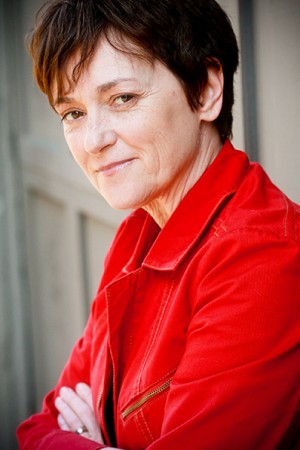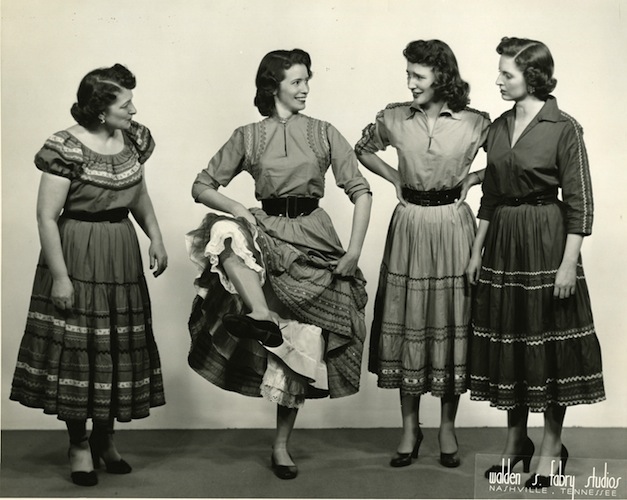Music Interview: Beth Harrington on The Carters, The Cashes, and the Course of Country Music
“The music itself is quite Gothic. It’s about murder, and death, and God, not all toe tapping stuff.”
The Winding Stream screens this Saturday at the Boston Film Festival: 5 p.m., Theatre One, 200 Stuart St., Boston, MA.
by Tim Jackson
On Saturday, as part of the 30th annual Boston Film Festival, producer and director Beth Harrington brings her film The Winding Stream to her hometown. The documentary looks at the history of the Carter family, beginning with A.P., his wife Sara, and his sister-in-law Maybelle and then moves on to daughter June Carter’s marriage to Johnny Cash, which deepened the legacy. The family’s contribution to country, folk, and roots music is vast and crosses generations of contemporary musicians. Many of the latter are featured in the film: Johnny and June Carter Cash, Rosanne Cash, John Prine, The Carolina Chocolate Drops, George Jones, Sheryl Crow, Kris Kristofferson with The Nitty Gritty Dirt Band. Born in Boston and now living in the Pacific Northwest, Harrington has been producing and making films for three decades. (As a side note—she also spent several years as a member of Jonathan Richman & The Modern Lovers.) Her subjects often explore American music and culture. Her previous documentary, Welcome to the Club – The Women of Rockabilly, surveyed the pioneering women of rock and roll and received a 2003 Grammy nomination.
Welcome to The Club was sent to Rosanne Cash, the daughter of Johnny Cash and June Carter:
“Rosanne wrote me one day and said. ‘Hey, I loved the film and I was just down in Virginia with my dad sitting around at the Carter Family fold and I said, Beth should be here making a film about this. She was concerned about her parents’ health so we didn’t get started right away. Then June died. Rosanne said ‘you better talk to my father right away.'” Cash died weeks after his interview.
I asked Harrington what it was like discovering and then documenting this seminal part of country music history:
“I like films that expand my own vocabulary in terms of subject. I know a fair amount about rock and roll, but I’m not really a country music person. If you told me that I’d be spending 12 years of my life making a movie about country music, I’d have said you were insane. But here I am. I learned a lot about country music, Americana, and the deep roots that transcend category.”
About the impact of these country roots on today’s artists, Harrington reflects:
“It intersects with so many kinds of music. The folkies took it and did one thing. There’s the country rock people. The Nitty Gritty Dirt Band and that whole era, they did their thing. Now the young hipster crowd, the Americana crowd, is doing things with it. The Carters almost don’t fit into country per se. It’s interesting to see a lot of big country stars paying lip service to this music, but I don’t really hear it in what they’re doing, but I do hear it with the Americana people. What are they? Are they folk, country? They are people, like Rosanne Cash, who are doing things that are hard to categorize. It’s something else.”
The Winding Stream is about more than music. It’s about family, history, the growth of the music industry, forgotten talents like Jimmie Rodgers, and a changing America:
“The music itself is quite Gothic. It’s about murder, and death, and God, not all toe tapping stuff. But beyond that, it is also the story of the music business and the beginnings of radio. The Carters were squarely in the middle of all that. These Carter sisters were pioneering.”
Another important theme in the narrative is the power of females: from Maybelle and Sara to June and then Rosanne, this is a women’s story. Harrington was attracted to this theme from the beginning:
“During the original recording (A.P. Carter, Sara’s husband) wasn’t there past the first day. He wandered off. The women were the act at a time when women just didn’t do that. Nobody expected it. They didn’t expect it of themselves. In doing so, the two of them made an incredible contribution to American music. Sara’s voice is one of the Rosetta Stones of how you sing country music. She was how you sing in the mountains and, of course, people have been changing it over the years. Maybelle made the guitar more of a lead instrument. Nobody did that. At the time it was considered more of a percussion instrument rather than a melody-making instrument. And she did it in such a way that people thought ‘hey, that’s a lead guitar.’ And now you can’t imagine country or folk music without guitar, but it wasn’t always that way.”
Tim Jackson is an assistant professor at the New England Institute of Art in the Digital Film and Video Department. His music career in Boston began in the 1970s and includes some 20 groups, many recordings, national and international tours, and contributions to film soundtracks. He studied theater and English as an undergraduate and has also has worked helter skelter as an actor and member of SAG and AFTRA since the 1980s. He has directed a trio of documentaries: Chaos and Order: Making American Theater about the American Repertory Theater, and Radical Jesters, which profiles the practices of 11 interventionist artists and agit-prop performance groups. His third documentary, When Things Go Wrong, about the Boston singer/songwriter Robin Lane, with whom he has worked for 30 years, has just been completed. He is a member of the Boston Society of Film Critics. You can read more of his work on his blog.
Tagged: A.P. Carter, Beth Harrington, Boston Film Festival, Country Music, documentary, Johnny Cash, June Carter, Maybelle Carter, Sara Carter



Thanks, Tim, for supplying the interview and, as a Carter Family super fan, I will be heading to the Saturday screening. As for Beth, I will never forget the one-person tour she gave me of the best of the North End in conjunction with her wonderful Boston film, The Blinking Madonna. However, I didn’t know that she was a member of the Modern Lovers!
I remember Beth talking about interviewing Johnny Cash. She said she felt like she got him to open up about June, because he thought the end was near. June Carter was the love of his life and he was lost without her.